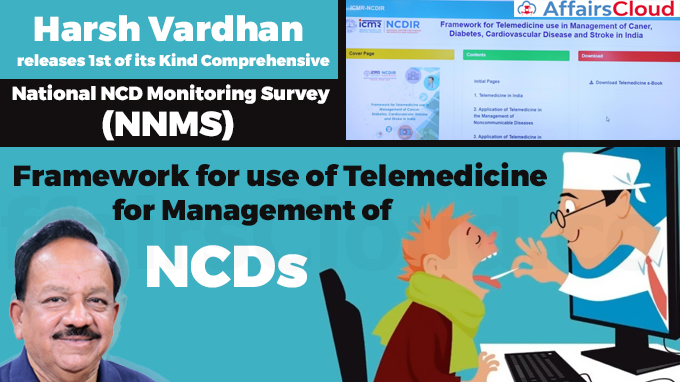 On 25th January, 2021, Dr Harsh Vardhan, Union Minister for Health & Family Welfare (MoHFW) virtually attended the Foundation day celebrations & Launch of Decadal year of the Indian Council of Medical Research – National Centre for Disease Informatics and Research (ICMR-NCDIR), Bengaluru, Karnataka. During the event he released
On 25th January, 2021, Dr Harsh Vardhan, Union Minister for Health & Family Welfare (MoHFW) virtually attended the Foundation day celebrations & Launch of Decadal year of the Indian Council of Medical Research – National Centre for Disease Informatics and Research (ICMR-NCDIR), Bengaluru, Karnataka. During the event he released
- National Non-Communicable Disease (NCD) Monitoring Survey (NNMS) 2017-18, 1st of its kind complete survey on NCDs using standardised tools & methods.
- Framework for Telemedicine use in Management of Cancer, Diabetes, Cardiovascular Disease and Stroke in India
Balram Bhargava, Director General of ICMR & Secretary of Health Research; Anu Nagar, Joint Secretary of Health Research, Dr Samiran Panda, Director, Division of Early Childhood Development (ICMR) were present during the event.
Harsh Vardhan Stated that 2020 was the Year of Science and Scientists owing to their contributions in the Pandemic.
i.National Non-communicable Disease Monitoring Survey (NNMS):
- The survey was conducted during the period of 2017-18, Base Year for measuring the progress is 2010.
- Objective – To collect data on key indicators such as risk factors, select NCDs & health systems response required for National NCD monitoring framework & NCD Action Plan.
- National Technical Working Group (TWG) was initiated to lead the survey which was implemented by 10 agencies.
- It covered Males and Females in the age group of 15-69 years in both urban and rural parts of the country.
ii.Key Findings:
- Average Daily intake of salt was 8 gms, which is higher than the World Health Organization (WHO) recommended level of 5 Grams/day. High Salt Consumption leads to raised Blood Pressure (BP) & increases the risk of heart disease and stroke.
- Two in Five adults & one in Four adolescents were undertaking insufficient levels of physical activity.
- More than one in every Four adults & 6.2% adolescents were overweight or obese
- Three out of Ten adults had raised BP & 9.3% had raised Blood Glucose
- Two in Five adults had three or more risk factors for NCDs
- One in every three adults & more than one-fourth proportion of men had consumed some of tobacco & consumed alcohol during the period of survey (2017-18).
- Risks of NCDs are more in Urban areas (52.8%) & Rural areas (34.2%).
- Based on WHO’s estimates of 2018, NCDs account for 63% of total deaths in India.
iii.The survey also highlights that around 40% of people have more than 3 factors which are responsible for NCDs. They are
- Daily Tobacco Consumption
- Lack of intake of nutrients
- Insufficient Physical activity
- Obesity
- High BP & increased fasting blood glucose levels.
iv.Consumption of fruits and vegetables is inadequate – 98.4 % percent adults consume less than five servings per day.
- 3 % adults respondents did not meet WHO’s recommendations on physical activity which is 600 Metabolic equivalents (METS) per week.
- Mustard oil was the most frequently used oil for cooking (48.8 per cent).
- The mean number of servings of fruit and vegetables per day was 1.7, which also failed to meet the recommendations of WHO.
v.Framework for use of Telemedicine:
- Harsh Vardhan also release Framework for Telemedicine use in Management of Cancer, Diabetes, Cardiovascular Disease & Stroke in India.
- Objective – For boosting remote healthcare & reducing inconvenience to patients to travel to hospitals for treatment of NCDs.
- The components of Telemedicine such as Tele-consultation, Tele-monitoring, Tele-triage can be utilized to enhance the care model for major NCDs.
- Telemedicine will address the promotive, preventive, curative, rehabilitative aspects of NCD care and management.
- Telemedicine can be adapted and used by Medical Practitioners in India from primary to Tertiary health care level via the National teleconsultation network & other platforms.
vi.According to a survey by WHO, 45% of NCDs occurred due to insufficient physical inactivity.
- In order to address the Physical Inactivity, Indian Government introduced the Fit India Movement in 2019.
Recent Related News:
i.On 24th September 2020, Kerala won the UN Interagency Task Force (UNIATF)Award 2020 for its contribution towards the Sustainable Development Goals(SDGs) related to the non-communicable diseases.
ii.December 12, 2020, According to the World Health Organization’s (WHO) 2019 Global Health Estimates Non-Communicable Diseases (NCD) constitute 7 of the World’s Top 10 causes of death.
About ICMR-NCDIR:
Director – Prashant Mathur
Headquarters – Bengaluru, Karnataka




